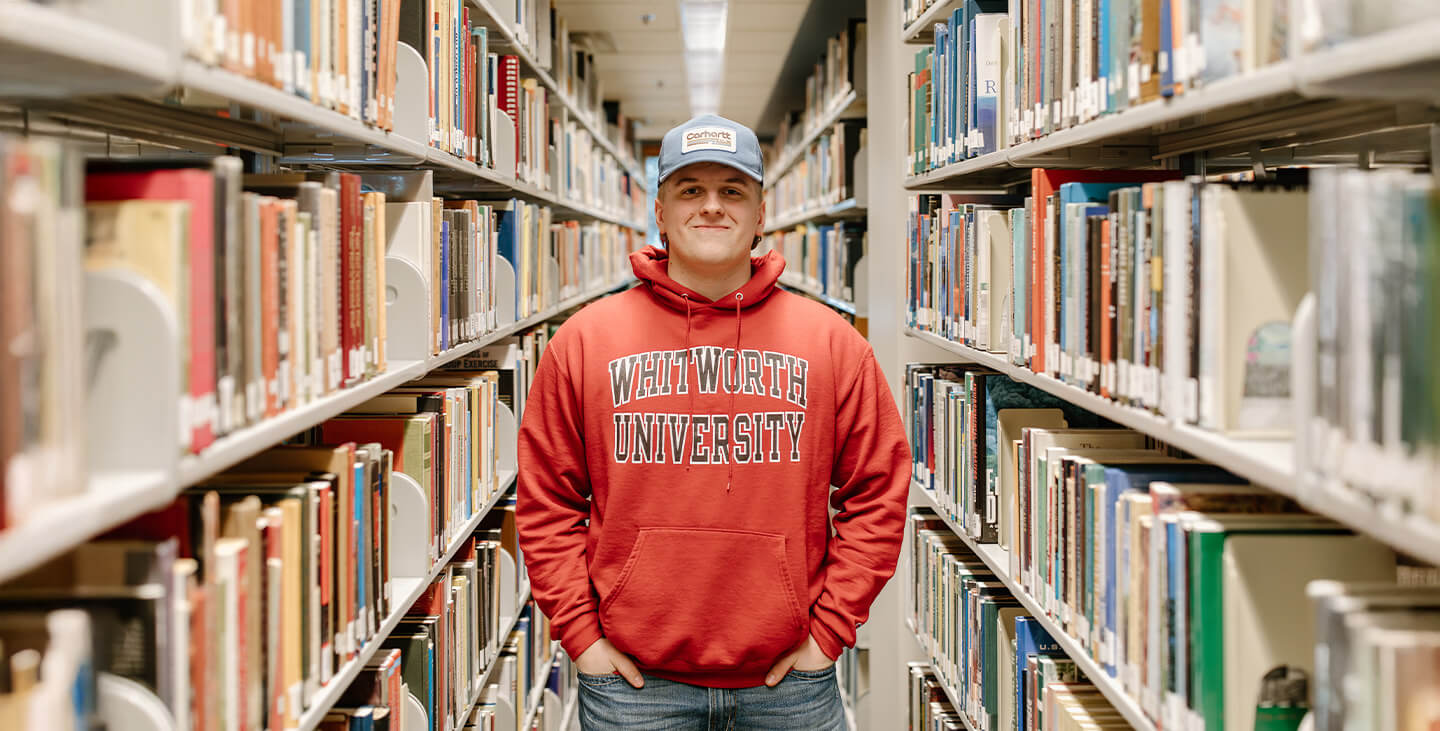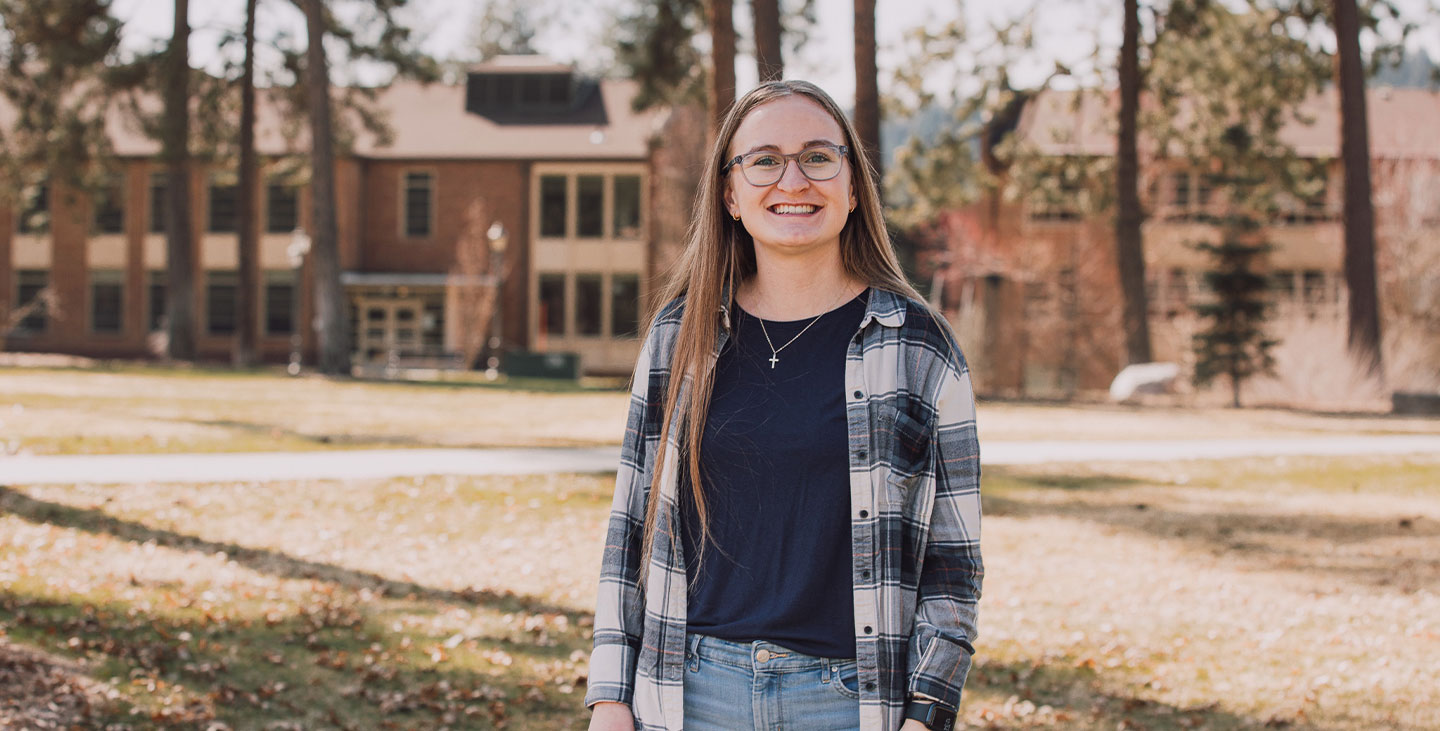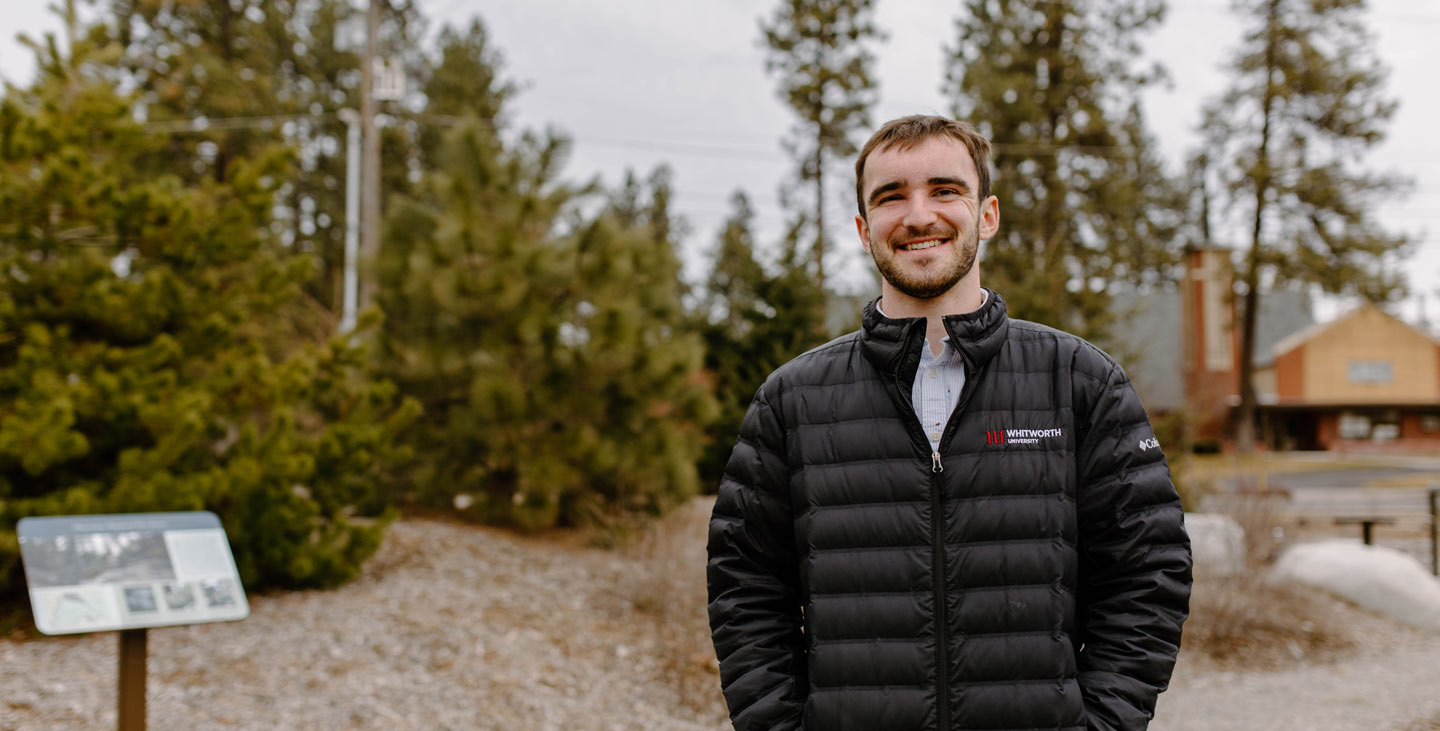History/Social Studies
 Hunter Niemi '27
Hunter Niemi '27
Why did you decide to study history/social studies?
I decided to study history and social studies because I find that my desire to teach pairs best with my curiosity about history. History spans so many years, and so many stories, that there is a story or time period that anyone could find a passion in.
What class has been your favorite so far?
My favorite class so far is a tie between The Roman Empire and Medieval Islam. Both courses have challenged me to think critically about historical events and broaden my abilities in historical analysis.
Tell us about a unique experience you've had or project you've worked on for your major.
The most unique project I have ever done was constructing a popsicle stick building as a replica for national park architecture. Many classes in my major challenge me to think outside the box and to present information in nontraditional formats.
What advice would you give to someone thinking about majoring in history/social studies?
If you are considering history/social studies as your major, I would encourage you to take classes on as many different historical subjects as possible, even those that don't seem particularly interesting to you. Before I came to Whitworth, I never imagined I would be so enthralled with ancient history as I am now!
What's your dream job?
My dream job is to be teaching world history in a high school classroom, coaching baseball and tending to a cattle farm one day.
Who are three people who have made a difference for you at Whitworth?
A couple of people who have made a difference for me at Whitworth would be my girlfriend and my roommate, both of whom make living at school the most fun experience of my life and have given me countless good times outside of the classroom. Academically, Professor [Corliss] Slack has taught me how to deconstruct what I assume about history to find the truth.
What's something that surprised you about your major?
I have been pleasantly surprised by how comfortable I have become in my classes. Because history/social studies is not a large major, you will find yourself in classes with the same people frequently – so, get to know them!
 Ashley Crawford '26
Ashley Crawford '26
Why did you decide to study history/social studies?
I decided to study secondary education and history/social studies with a minor in theology because of the relationship these subjects have in empowering an understanding of society, encouraging growth and education, and leaning into service as Christ's ambassadors in the world by acting upon what we have learned. History specifically has been a passion of mine throughout school because of the significant influence of former history teachers. History also provides the incredible opportunity to examine people who have come before us and learn about how our society has developed into what it is today.
What classes have been your favorite so far?
One of my favorite history classes so far has been Global Christianity because of the in-depth overview of the history of Christianity across the globe and what it looks like in different countries, traditions and cultures in the present moment. I also appreciated taking American History Since 1877 because of our discussions around social, political and religious movements in modern American history with connection to their lasting local and global impact.
Tell us about a unique experience or project you've worked on for your major.
Through the Becoming a Historian course, I did an archival project in which I gathered information from journals, newspapers and photographs from the Whitworth University Archives. Through this research, I had the privilege of learning about the life of a Whitworth college student by the name of Augustus Williams, in the early 1900s when Whitworth was in Tacoma, Wash., before moving to Spokane in 1914. Alongside scholarly literature, I compiled my findings into a research paper analyzing Augustus' academic, social, personal and athletic pursuits as they corresponded to higher education at the time.
What advice would you give to someone thinking about majoring in history/social studies?
No matter what field or vocation you are interested in, history impacts all our lives. That is why it is so meaningful to learn about historical figures, movements and periods, alongside analyzing different types of historical thinking so we can draw connections and make implications for living in our community and the world today. Studying history also provides benefits like critical thinking and pairs well with other majors or minors. Additionally, learning from history professors who are passionate about their areas of study and personal experience with research is so rewarding. For instance, I have greatly appreciated hearing about Dr. Anthony Clark's research studies in China and Dr. Aaron Griffith's research on criminal justice.
What's your dream job?
My dream job is to help empower students' holistic growth and development by teaching high school leadership and history/social studies, alongside serving through campus ministry.
Who are three people who have made a difference for you at Whitworth?
So many incredible people have made a difference for me at Whitworth and are not limited to the three people listed below. Through the history department, Dr. Aaron Griffith has had a profound impact on me because he inspires thoughtful, deep reflection on the significance of what we are doing as historians, along with drawing connections between theology, Christianity and history. He also inspires responding justly by looking in detail and with intentionality to the stories of people who have come before us. I greatly appreciated his support through various papers, including my first archival research project, and how he has guided me to excel by stretching my awareness of my capabilities as a student. Moreover, Rev. Lauren Taylor has played a significant role in my faith journey at Whitworth. Lauren has encouraged me to become even more passionate about living out my faith, and it has been a true joy getting to know her. She has poured into my faith in many magnificent ways by being a role model and empowering me to serve in ministry. I am very thankful for her insight and wisdom alongside the campus ministry department for encouraging us to be faithful servants! Furthermore, Dr. Josh Leim has been an incredible theology professor. Not only is he full of compassion and kindness, but he is deliberate in preparing thorough lectures and making considerate replies to all students' assignments. Regardless of how much education he has, he does not let that get in the way of being humble, especially in conversations with students through valuing our thoughts and questions.
Why did you choose to attend Whitworth?
I chose to attend Whitworth because I knew I would thrive in the intentional Christian community with faith development alongside academics being embedded into the curriculum through its strong mission. I wanted to major in history/social studies and education, which Whitworth is well-known for, but I also wanted to study theology, so Whitworth provided the opportunity to do all of that. The small class sizes were also an important factor in being able to connect with professors and peers. In addition to Whitworth being a beautiful campus, its resources like campus ministry and empowering students to apply their faith and service were also intriguing.
How would you describe Whitworth?
Whitworth is an intentional Christian community that values contemplative reflection, growth and engagement to holistically support students to serve others and glorify God. It provides opportunities for implementing learning and leadership, not only through rigorous academics, but also through various student life avenues including athletics, residence life, campus ministry, music, ASWU, and other clubs and programs.
 Tyler Rohrman '22
Tyler Rohrman '22
Why did you decide to study history/social studies?
One of the biggest influences as to why I decided to study history and social studies is that my father teaches those subjects at the high school in my hometown. Politics, current events, history and philosophy were common discussions at the dinner table over the years, and I naturally became fascinated with those topics and issues. While in high school I also had excellent history and social studies teachers who not only provided the core knowledge necessary for understanding those subjects but also made them exciting and relevant.
What are some of your favorite classes so far?
Each history/social studies related class that I have taken at Whitworth has helped me to engage with a different culture, history or perspective, and for that reason it is difficult to pick a favorite course. That being said, Pirates: A World History from an Outlaw's Point of View with Dr. Corliss Slack was the first time I realized how fun history could be. Dr. Slack gave me a better understanding of historical processes and world history through the unconventional lens of pirates. By viewing history from the perspective of pirates, historical figures often romanticized in contemporary culture, I was constantly in awe of how much one could learn, let alone how engaging class could be. In addition to Dr. Slack's course, American National Politics with Dr. Kathy Lee has also been a foundational experience for my development as both a student and a citizen. Dr. Lee expanded my understanding of politics and American society by exposing me to worldviews that were previously unknown to me. Furthermore, she provided perspective and analysis that helped to debunk stereotypes and assumptions about issues, political figures and perspectives.
Tell us about a unique experience you've had or project you've worked on for your history/social studies major.
While taking the Becoming a Historian course with Dr. Corliss Slack, I had the opportunity to work with my fellow historians to develop a display case that would be exhibited in the library. The premise of the project was to do our own authentic research on a piece of Spokane history. My group was tasked with Natatorium Park, an amusement park that was extremely popular in the early 20th century. The project required considerable amounts of research, time, energy and advising from Dr. Slack. Nevertheless, our group became fascinated with Nat Park's development as well as its shortcomings related to racial prejudice. The history was alive for us as we traveled across Spokane collecting primary and secondary sources. Fun fact: The Looff Carrousel at Riverfront Park in downtown Spokane was originally from Natatorium Park! Sadly, due to the COVID-19 pandemic, our exhibit was not able to come to fruition. But the lessons learned about Natatorium Park and our study of historiography (the writing of history) will stick with me well into the future.
What advice would you give to someone thinking about majoring in history/social studies?
As you learn about historical, political and social perspectives, understand that you are developing skills that will help you foster empathy and compassion. Present events, decisions and actions are rooted in past events. This is true at both a personal and global level. History and social studies will help you identify not only your own personal development, but how history shapes the development of the people, institutions and world around you.
What's your dream job?
My dream job is to work in a position, likely as a history/social studies teacher in a secondary school, in which I can share my passion of history and social studies with the next generation. I believe my calling is to empower students with the knowledge and tools necessary to be civically active on local, state and national levels.
What's something that surprised you or might surprise other students about the history major?
As a freshman, I generally understood that both Whitworth faculty and students placed a premium on relationships and community. However, I did not anticipate the community and relationships that I would find within the history department. While not surprising, history students and professors at Whitworth have been extremely supportive, compassionate and empathetic during the struggles of the COVID-19 pandemic. I have peace of mind knowing that I can lean on them as well as find signs of hope in the history that we study together.
Why did you choose to attend Whitworth?
I chose to attend Whitworth because I knew I wanted to continue my postsecondary education at a smaller university that would allow me to explore Christianity while also receiving a quality education. Whitworth was particularly attractive to me because it did not require a statement of faith from its students. Instead, the university was keen on meeting students where they are at. Resources and opportunities to grow in my faith along with a welcoming community made Whitworth feel like the natural next step for my education.
How would you describe Whitworth?
Whether it is through faith, academics, athletics or other social groups, Whitworthians exhibit a willingness to seek out new experiences, have tough conversations and ask big questions. At Whitworth, we seek to go beyond common and simple assumptions that shape our faith and worldview. Instead, we dive into complexity and explore answers from multiple perspectives. Whitworth is a place where academic debates do not exclude spirituality and religion. We embrace our faith and allow it to guide us through challenges in the classroom, on the field of play, and in the arena of life. By rising to meet challenges and embracing complexity, Pirates sail towards our goal of honoring God, following Christ and serving humanity.